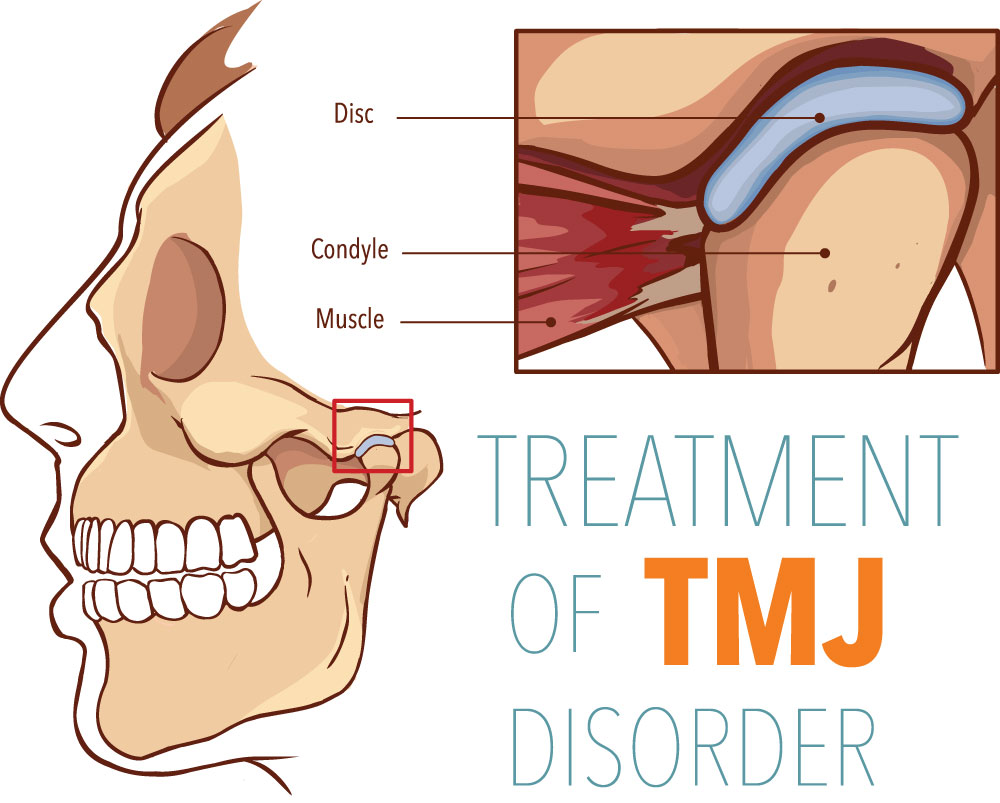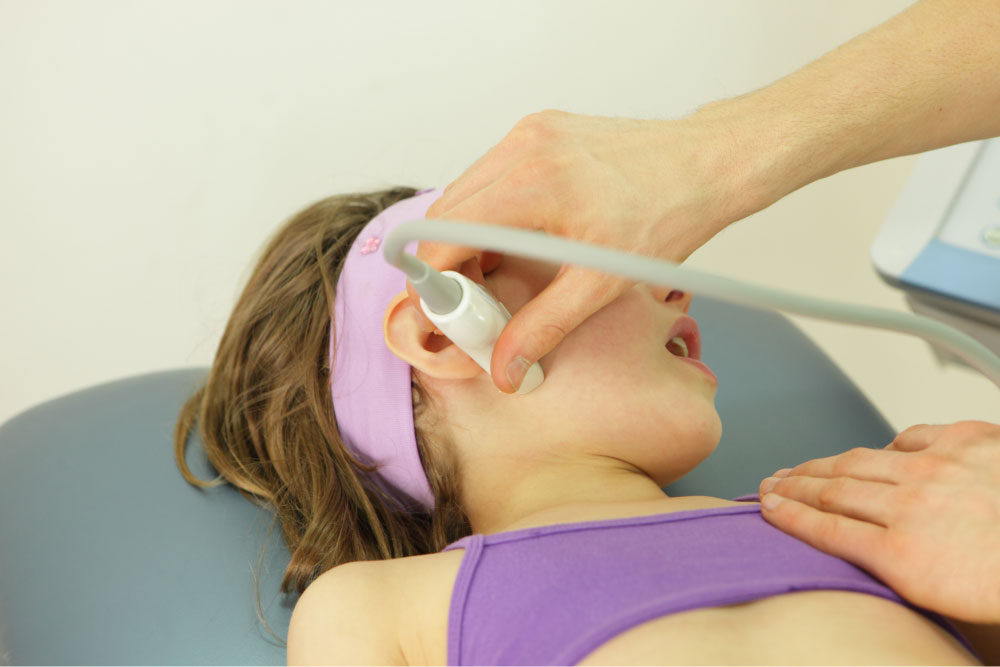
Physical Therapy for treatment of TMJ
Do you have headaches, ringing in your ear, or is your hearing muffled? Or maybe you have jaw pain, clicking, or popping with chewing, singing, or yawning. These are symptoms of temporomandibular joint (TMJ) dysfunction, the joints where your jaw attaches to the skull.
The unique thing about the TMJs is that they are the only pair of joints that must work in together so you can talk, laugh and chew. The temporomandibular joint combines a hinge action with sliding motions. The parts of the bones that interact in the joint are covered with cartilage and are separated by a small shock-absorbing disk, which normally keeps the movement smooth. Improper movement on one side will affect movement on the other side. The ear canal is very close to the TMJ and that is why you can have ear pain or ringing of the ears.
Contributing Factors
Pain and movement problems occur when the surrounding ligaments and the muscles of chewing get inflamed. Though the causes of TMD are not known, commonly seen in people with TMJ is poor posture emotional stress and changes in the position of the teeth.
Have ever seen a picture of yourself from the side and see that your head is forward of your shoulders (forward head posture)? This posture can cause headaches and neck pain from the back to the front of your head and cause the muscles around the jaw function incorrectly leading to pain. Very often the headaches from this are wrongly assumed to be “sinus headache” because where the headache pain is felt in the front of the face. What are the symptoms of TMJ? Is TMJ causing my frequent headaches? Do popping jaw joints mean
Have ever seen a picture of yourself from the side and see that your head is forward of your shoulders (forward head posture)? This posture can cause headaches and neck pain from the back to the front of your head and cause the muscles around the jaw function incorrectly leading to pain. Very often the headaches from this are wrongly assumed to be “sinus headache” because where the headache pain is felt in the front of the face. What are the symptoms of TMJ? Is TMJ causing my frequent headaches? Do popping jaw joints mean
Common symptoms of Temporomandibular Joint disorder can include:
- Pain or tenderness of the ear, jaw, jaw joints and facial muscles
- Headaches
- Temple pain
- Throat pain
- Pain with opening the jaw
- Pain with chewing
- Neck, shoulder, back and arm pain
- A ‘locking’ sensation of the joint
- Clicking, popping and grating noises
While TMJ can result in headaches, there are many factors that can cause your headache and TMJ is just one possibility. Stress can cause us to clench our teeth. This clenching puts undue pressure on our teeth, which can lead to TMJ.
While popping jaw joints is indeed a symptom of TMJ, it is not a guarantee of the condition. Many people experience intermittent clicking in their jaws, so on its own, it is not a cause for alarm. However, when combined with other symptoms such as headache or jaw pain, you should consult a medical opinion.
Chat With An Expert
If you have questions about how we can help you with headaches or back or neck pain, talk with one of our experts.
Habits that Can Lead to TMJ
There are many habits that people have that can lead to TMJ. These oral parafunctional (bad) habits are daily unconscious uses of the mouth UNRELATED to eating, drinking, or speaking. Examples of oral parafunctional habits are:
- Non-nutritive chewing: chewing pencils/pens, nails, lips, tongue, cheek, or hair. This also includes chewing gum and ice. Chewing hard candy is also detrimental to teeth and the jaw.
- Non-nutritive sucking (pacifier, finger/thumb)
- Bruxism: clenching or grinding the teeth. Do you carry your stress in your jaw, neck, or shoulders?
- Thrusting jaw forward while speaking or while working out at the gym.
- Tongue thrusting: this causes the tongue to put tension on the teeth and jaw in an abnormal pattern, so it is also called tongue tension.
- Resting your chin on your hand.
- Slumping while you stand, sit, drive, text (text neck), use the computer or read.
- Sleeping on your stomach! You have to turn your head to breathe, and this puts sideways (lateral) pressure on your jaw, in addition to being bad for your neck.
- Taking large bites of food, especially hard foods.

How We Can Help You with TMJ
Can anything be done to help with TMJ pain? Yes! We start by assessing your neck to see if your posture is affecting your jaw biomechanics. We look at your neck position, movements of the joints and condition of the muscles around the neck. We will also check your TMJ and determine if the joint or muscles or both are contributing to your symptoms
Based on careful evaluation we develop a treatment plan customized to your individual needs. Some of the techniques may include manual therapy, dry needling to trigger points in the neck and jaw (masticatory) muscles, exercises to retrain your jaw biomechanics and posture, and modalities such as ultrasound or electrical stimulation to ease your symptoms. We can also help you become aware of and self-monitor for unconscious behaviors, you have in daily habits that contribute to jaw pain. At Lee Miller Rehab Associates, we can help you determine if your neck, or jaw, or both can be helped with physical therapy.
Based on careful evaluation we develop a treatment plan customized to your individual needs. Some of the techniques may include manual therapy, dry needling to trigger points in the neck and jaw (masticatory) muscles, exercises to retrain your jaw biomechanics and posture, and modalities such as ultrasound or electrical stimulation to ease your symptoms. We can also help you become aware of and self-monitor for unconscious behaviors, you have in daily habits that contribute to jaw pain. At Lee Miller Rehab Associates, we can help you determine if your neck, or jaw, or both can be helped with physical therapy.
Consider calling to see if you qualify for a free screening of your jaw and neck at Lee Miller Rehab Associates.
Request an Appointment
Specialized Care for Your Physical Therapy Needs
At Lee Miller Rehab, we are your strongest proponents for rehabilitation. We believe that being well-informed about your specific health situation is the first step in your recovery. We will educate you on the specific aspects of physical therapy that will provide you with the best outcome. We will work closely with you and monitor your progress, making adjustments along the way that will speed your healing.
If you have any questions or are would like to request an appointment, please fill out the form, and a member of our team will follow up with you ASAP.
